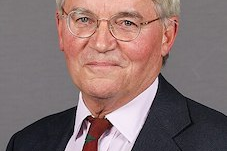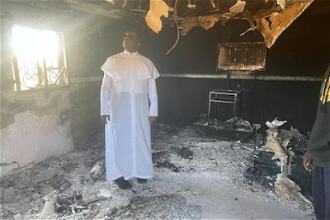Pope's teaching on the family
On Monday evening Pope Benedict XVI opened the Diocesan Ecclesial Congress at St John's Cathedral in Rome on 'The Family and the Christian Community: formation of the person and handing on the faith', with a lengthy address on the family. Fides has sent the following excerpts. The anthropological foundation of the family Marriage and the family are not a fortuitous sociological construction, the result of certain historical and economic situations. On the contrary the question of the proper relationship between man and woman is rooted in the deepest essence of the human being and only here can it find its answer. It cannot be separated from the old and ever new query of every person: who am I? What is mankind? And this question, in turn, cannot be separated from the question about God: does God exist? And who is God? What does he look like? The Bible's reply to these two queries is unitary and consequential: we are created in the image of God and God is love itself. This explains why what renders the human person an authentic image of God is the vocation to love: a man or woman becomes similar to God to the extent that he or she becomes a person who loves. This fundamental bond between God and the human person is followed by another: the indissoluble unity of spirit and body: the person is in fact a soul expressed through the body and a body vivified by an immortal spirit. This is why the human body has, so to say, a theological character, it is not only body, what is biological in the person is not only biological, it is the expression and accomplishment of that person's humanity. Likewise human sexuality is not outside our person, it is part of our humanity. Only if sexuality is integrated into the person can it assume meaning. Thus from these two bonds between the human person and God and between the human person, body and soul, stems another connection between the person and the institution. The totality of the person includes in fact the dimension of time, and when a person says "yes" he or she goes beyond the present moment: in its entirety "yes" means "always" and it constitutes the space of fidelity. Only in this 'yes' can there grow that faith which gives future and enables children, the fruit of love, to believe in humanity and in the future of humanity at difficult times. The freedom of "yes" is therefore freedom to assume that which is definitive: the greatest expression of freedom therefore is not seeking pleasure, without ever reaching a sincere decision. Only apparently does this permanent openness seem to be the realisation of freedom, but it is not: instead the real expression of freedom is the capacity to decide to make a definitive gift in which freedom gives itself and so full! y finds itself. In concrete, the personal and reciprocal "yes" of the man and the woman makes room for the future and for the authentic humanity of both and at the same time is open to the gift of a new life. Hence this personal "yes" can only be also a publicly responsible "yes", with which husband and wife assume a public responsibility to fidelity which also guarantees a future for the community. In fact we do not belong exclusively to ourselves: and therefore each one is called to assume in profundity his or her own public responsibility. Hence matrimony as an institution is not some illicit interference on the part of society or the authorities, the imposition from outside of a form on the most private reality of life; instead it is the intrinsic need of the conjugal pact of love and the profundity of the human person. The various present-day forms of dissolution of matrimony, free unions and "trial marriages", and even pseudo-matrimony between people of the same sex, are instead expressions of an anarchical freedom which claims wrongly to be authentic liberation of the human person. This sort of pseudo-freedom is based on a trivialisation of the human body which leads inevitably to a trivialisation of the human person. It stems from the assumption that one can do what one likes with one's own person: thus the body becomes something secondary, from the human point of view something which can be manipulated, used as one pleases. Libertinism, which claims to be the discovery of the human body and its value, is in actual fact dualism which debases the body, excluding it so to say from the authentic being and dignity of the human person. Source: Fides


















